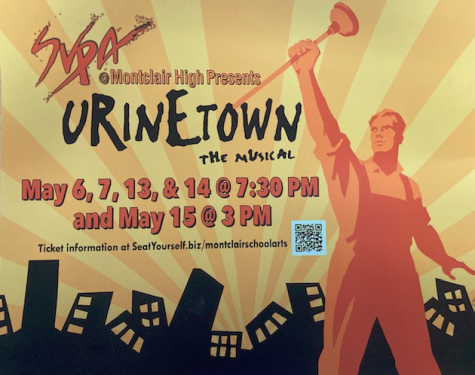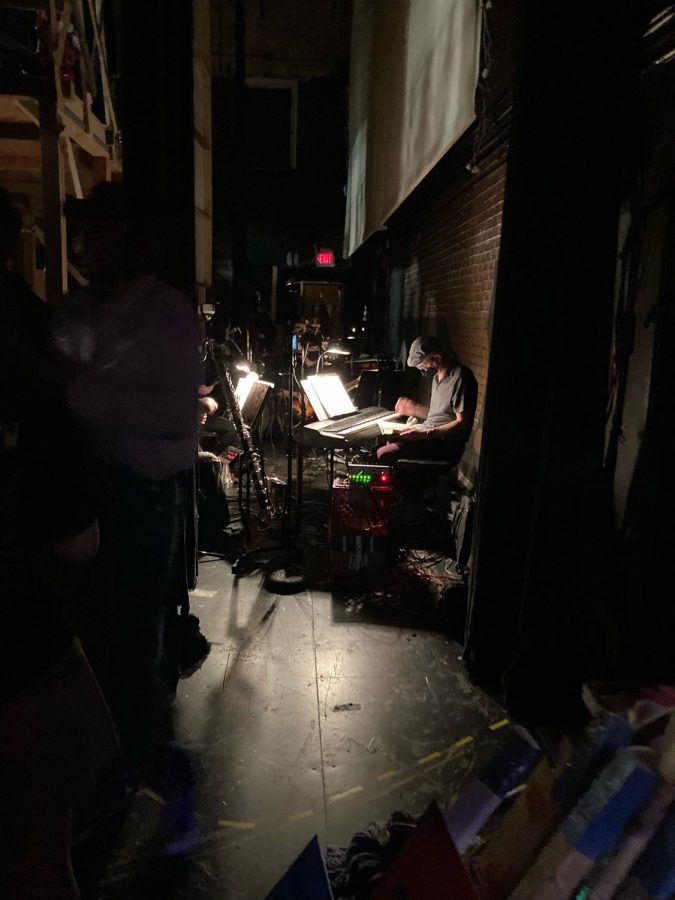Big time talent visits the MHS Little Theater
May 10, 2022
 On March 30, Tony Award-winning playwright Greg Kotis visited the Montclair School of Visual and Performing Arts to discuss the high school’s upcoming production of Kotis’s musical, Urinetown. Kotis explained the process of creating and putting together the musical and gave some much-appreciated advice on the subjects acting and writing. Gary Rudoren, director of tech for SVPA, guided the Little Theater discussion, as he and Kotis have known each other for many years.
On March 30, Tony Award-winning playwright Greg Kotis visited the Montclair School of Visual and Performing Arts to discuss the high school’s upcoming production of Kotis’s musical, Urinetown. Kotis explained the process of creating and putting together the musical and gave some much-appreciated advice on the subjects acting and writing. Gary Rudoren, director of tech for SVPA, guided the Little Theater discussion, as he and Kotis have known each other for many years.
Not only did Kotis discuss the ideas and events that led him to write Urinetown, but he went in depth about several of the characters, illuminating the corresponding actors about what he was envisioning when he wrote them into existence and sharing stories of about the characters transformed through involvement from the original cast and crew.
When it was time for questions, Senior Riley Polaner asked Kotis for some advice about how to play a certain scene in which her character, to act properly distraught at the kidnapping of her husband, and simultaneously allow the scene to retain its intended comedy.
Kotis responded by talking about his experience struggling to find ways to allow the audience to laugh, even when horrible things are happening on stage. His favorite way of doing this is by allowing all of the characters to be perfectly authentic, and then taking their reactions just one step further. This is the comedy of Urinetown, and the technique Kotis advises Montclair High School students to explore in their own writing and acting.
Just as relevant as Kotis’ insights into the play itself was his advice about writing. Actor Aidan Cummings thought that Kotis stands out from other writers because he hasn’t mythologized himself and, when addressing the students, was very easy to understand as a human. He said, “He deals with writer’s block, and he’s a pretty spontaneous guy, and he writes for fun. He writes about what’s around him, but it also has intent and it has a message. And that’s something really special.”
Kotis prefers to begin his writing process in a “creative state,” during which he writes whatever he thinks, without slowing down enough to allow himself to criticize or think logically. Sometimes, he even turns down the brightness of his computer so he can’t see what he has written at all. The next step is to go through with his “critical brain.”
Reminiscing about this piece of advice, sophomore Rex Roche said, “I think this was a good lesson that says it’s okay to let your mind wander a little bit and you can get very good things out of sort of just not thinking critically and just thinking outside of the box. And then coming in later, if you’re creating something, with that critical mindset to put it together into that cohesive thing.”
Charlie Bollinger, who is preparing to go to film school, said Kotis provided some of the most helpful bits of advice about writing he has ever heard.
“I’m a senior and I’m about to go to college. I know I’m going to do either film or music, and they’re not the same thing as theater, but it’s a similar thing where you need a producer, you need some corporate person with money to believe in you,” Bollinger said. “It was just very inspiring to hear that he didn’t even expect that to happen and it just sort of happened accidentally and I’d like to hear more and more people in his position talk about their stories.”
Subject matter aside, Aidan Cummins said learning from those inside theater allows students to see the practical application of their study of literature and drama. “I think it means so much to hear something from the source from which it was created. As much as on the surface this show sounds like it’s just about pee, there are, of course, multiple layers of symbolism and commentary and the characters are complex. They are reflections of real life.”

